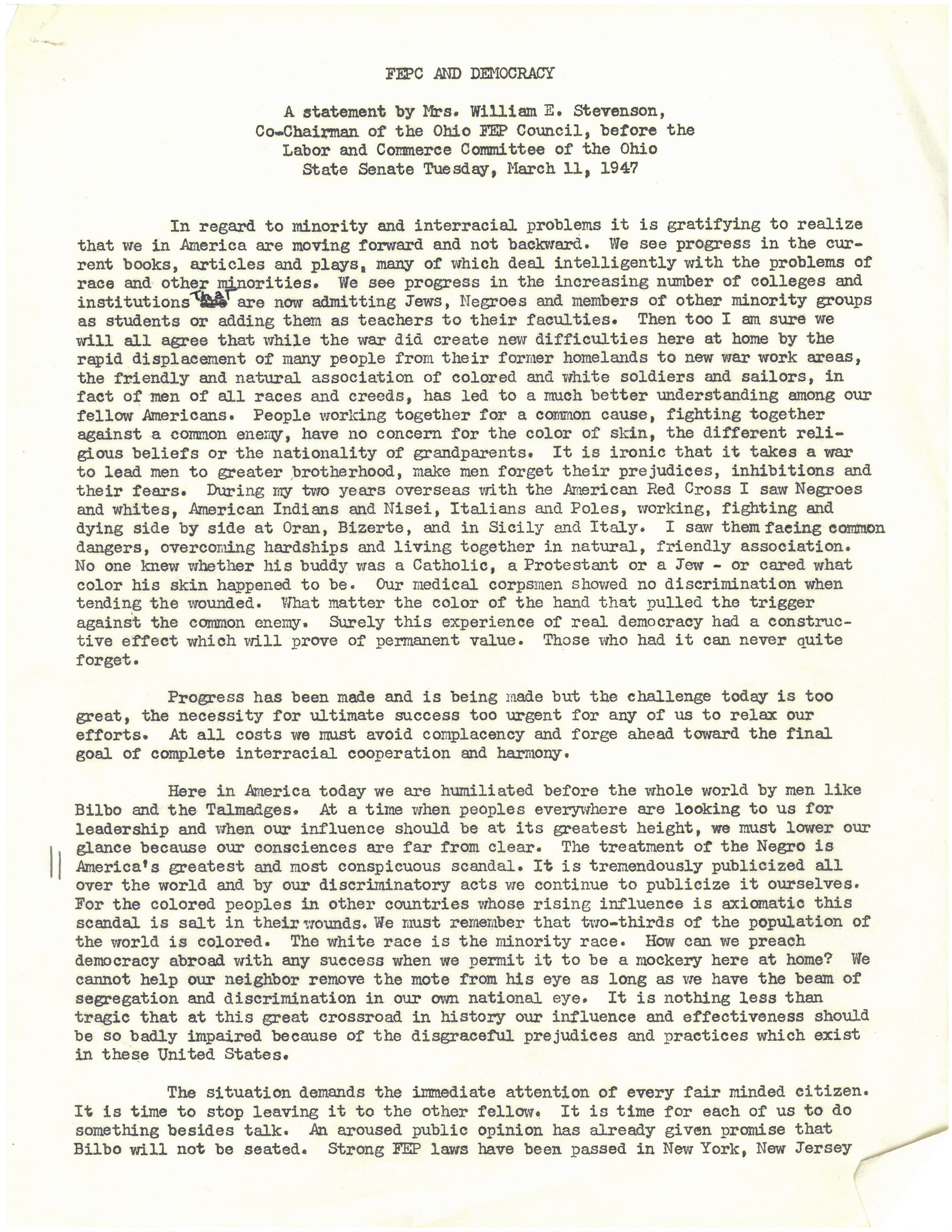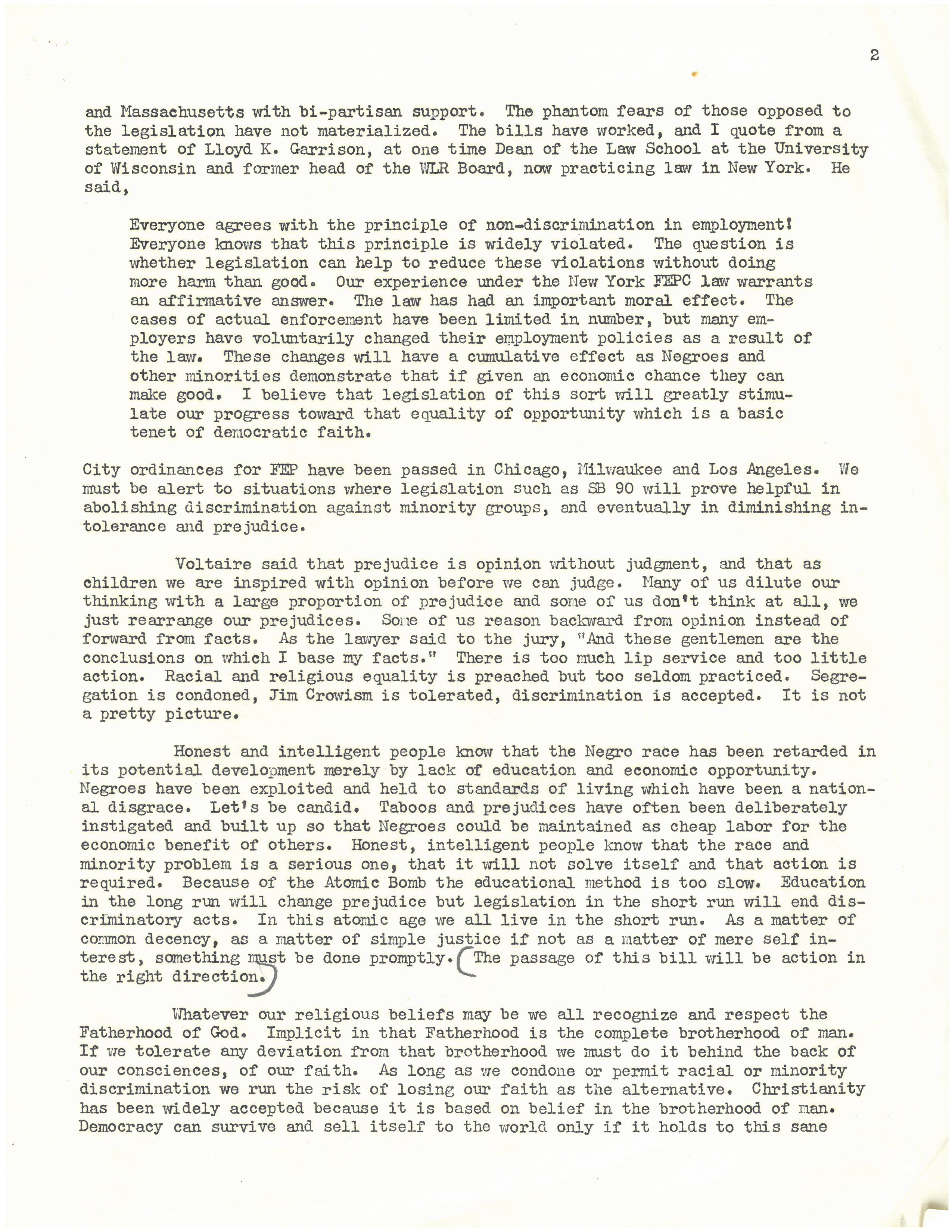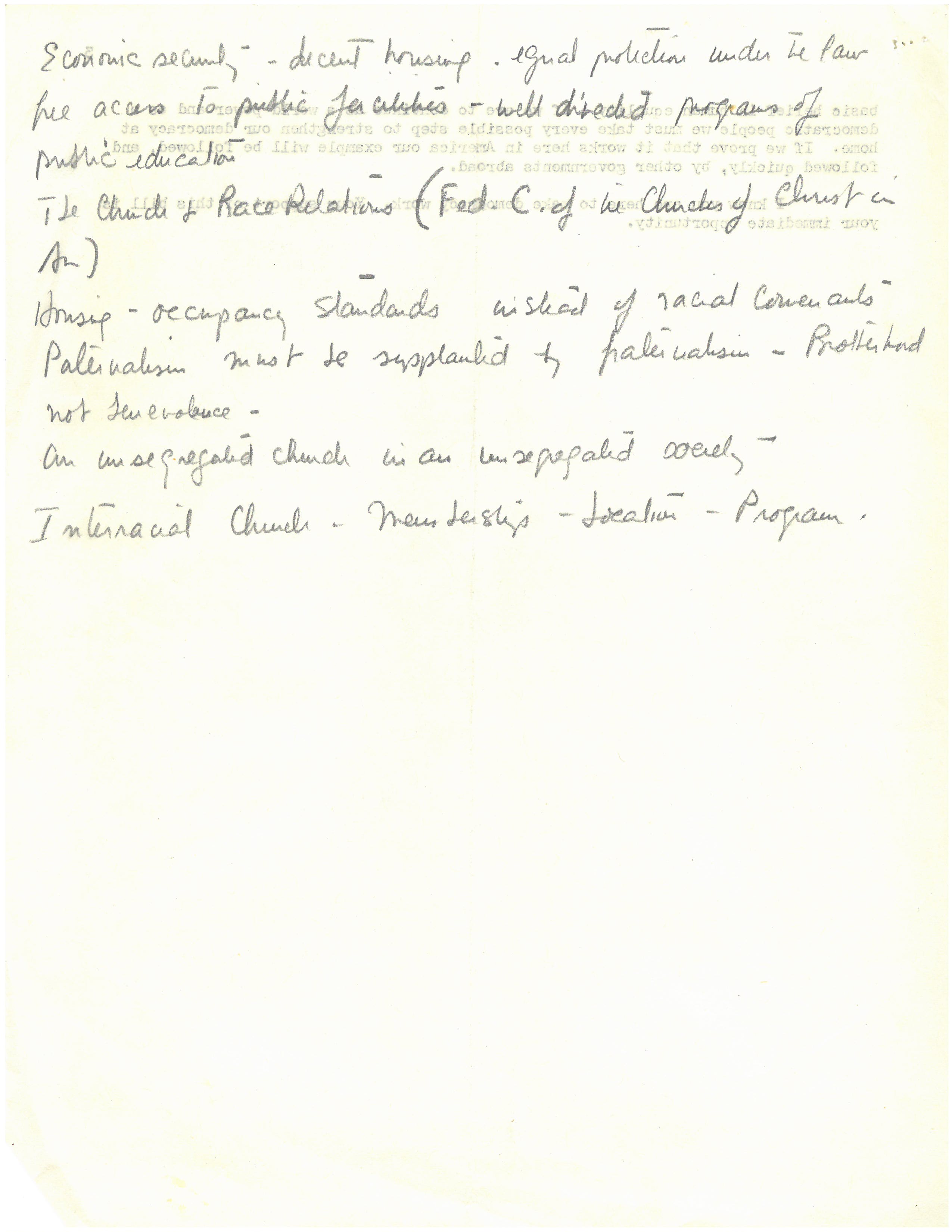|
|
Transcription:
FEPC AND DEMOCRACY
A statement by Mrs. William E. Stevenson, Co-Chairman of the Ohio FEP Council,[3] before the Labor and Commerce Committee of the Ohio State Senate Tuesday, March 11, 1947
In regard to minority and interracial problems it is gratifying to realize that we in America are moving forward and not backward. We see progress in the current books, articles and plays, many of which deal intelligently with the problems of race and other minorities. We see progress in the increasing number of colleges and institutions are <that> are now admitting Jews, Negroes and members of other minority groups as students or adding them as teachers to their faculties. Then too I am sure we will all agree that while the war did create new difficulties here at home by the rapid displacement of many people from their former homelands to new war work areas, the friendly and natural association of colored and white soldiers and sailors,[4] in fact of men of all races and creeds, has led to a much better understanding among our fellow Americans. People working together for a common cause, fighting together against a common enemy, have no concern for the color of skin, the different religious beliefs or the nationality of grandparents. It is ironic that it takes a war to lead men to greater brotherhood, make men forget their prejudices, inhibitions and their fears. During my two years overseas with the American Red Cross I saw Negroes and whites, American Indians and Nisei,[5] Italians and Poles, working, fighting, and dying side by side at Oran, Bizerte, and in Sicily and Italy.[6] I saw them facing common dangers, overcoming hardships and living together in natural, friendly association. No one knew whether his buddy was a Catholic, a Protestant, or a Jew -or cared what color his skin happened to be. Our medical corpsmen showed no discrimination when tending the wounded. What matter the color of the hand that pulled the trigger against the common enemy. Surely this experience of real democracy had a constructive effect which will prove of permanent value. Those who had it can never quite forget. Progress has been made and is being made but the challenge today is too great, the necessity for ultimate success too urgent for any of us to relax our efforts. At all costs we must avoid complacency and forge ahead toward the final goal of complete interracial cooperation and harmony. Here in America today we are humiliated before the whole world by men like Bilbo[7] and the Talmadges.[8] At a time when peoples everywhere are looking to us for leadership and when our influence should be at its greatest height, we must lower our glance because our consciences are far from clear. The treatment of the Negro is America’s greatest and most conspicuous scandal. It is tremendously publicized all over the world and by our discriminatory acts we continue to publicize it ourselves. For the colored peoples in other countries whose rising influence is axiomatic this scandal is salt in their wounds. We must remember that two-thirds of the population of the world is colored. The white race is the minority race. How can we preach democracy abroad with any success when we permit it to be a mockery here at home?[9] We cannot help our neighbor remove the mote from his eye as long as we have the beam of segregation and discrimination in our own national eye.[10] It is nothing less than tragic that at this great crossroad in history our influence and effectiveness should be so badly impaired because of the disgraceful prejudices and practices which exist in these United States. The situation demands the immediate attention of every fair minded citizen. It is time to stop leaving it to the other fellow. It is time for each of us to do something besides talk. An aroused public opinion has already given promise that Bilbo will not be seated. Strong FEP laws have been passed in New York, New Jersey and Massachusetts with bi-partisan [sic] support.[11] The phantom fears of those opposed to the legislation have not materialized. The bills have worked, and I quote from a statement of Lloyd K. Garrison,[12] at one time Dean of the Law School at the University of Wisconsin and former head of the WLR Board,[13] now practicing law in New York. He said,
Everyone agrees with the principle of non-discrimination in employment! Everyone knows that this principle is widely violated. The question is whether legislation can help to reduce these violations without doing more harm than good. Our experience under New York FECP law warrants an affirmative answer. The law has had an important moral effect. The cases of actual enforcement have been limited in number, but many employers have voluntarily changed their employment policies as a result of the law. These policies will have a cumulative effect as Negroes and other minorities demonstrate that if given an economic chance they can make good. I believe that legislation of this sort will greatly stimulate our progress towards that equality of opportunity which is a basic tenet of democratic faith.
City ordinances for FEP have been passed in Chicago, Milwaukee and Los Angeles. We must be alert to situations where legislation such as SB 90[14] will prove helpful in abolishing discrimination against minority groups, and eventually in diminishing intolerance and prejudice. Voltaire[15] said that prejudice is opinion without judgement, and that as children we are inspired with opinion before we can judge. Many of us dilute our thinking with a large proportion of prejudice and some of us don’t think at all, we just rearrange our prejudices. Some of us reason backwards from opinion instead of forward from facts. A the lawyer said to the jury, “And these gentlemen are the conclusions on which I base my facts.” There is too much lip service and too little action. Racial and religious equality is preached but too seldom practiced. Segregation is condoned, Jim Crowism is tolerated, discrimination is accepted. It is not a pretty picture. Honest and intelligent people know that the Negro race has been retarded in its potential development merely by lack of education and economic opportunity. Negroes have been exploited and help to standards of living which have been deliberately instigated and built up so that Negroes could be maintained as cheap labor for the economic benefit of others. Honest, intelligent people know that the race and minority problem is a serious one, that it will not solve itself and that action is required. Because of the Atomic Bomb the educational method is too slow. Education in the long run will change prejudice but legislation in the short run will end discriminatory acts. In this atomic age we all live in the short run. As a matter of common decency, as a matter of simple justice if not as a matter of mere self interest, something must be done properly. <(> The passage of this bill will be action in the right direction.<)> Whatever our religious beliefs may be we all recognize and respect the Fatherhood of God. Implicit in that Fatherhood is the complete brotherhood of man. If we tolerate any deviation from that brotherhood we must do it behind the back of our consciences, of our faith. As long as we condone or permit racial or minority discrimination we run the risk of losing our faith as the alternative. Christianity has been widely accepted because it is based on belief in the brotherhood of man. Democracy can survive and sell itself to the world only if it holds to this same basic belief in human equality. If we are to continue as a world power and as a democratic people we must take every possible step to strengthen our democracy at home. If we prove that it works here in America our example will be followed, and followed quickly, by other governments abroad. I know you are here to make democracy work. Your support of this bill is your immediate opportunity. |
[1] “Obituaries and Letters of Condolence” Subgroup II. Eleanor B. Stevenson papers, Series 4. Honors and Miscellaneous Personal Papers, Box 1. William and Eleanor Stevenson Papers, RG 30/219. O.C.A.
[2] Anthony S. Chen, The Fifth Freedom: Jobs, Politics, and Civil Rights in the United States, 1941-1972. Princeton Studies in American Politics (Princeton: Princeton University Press, 2009), 118-122.
[3] This is probably a forerunner to the Ohio Council for Fair Employment Practices, which was the group that continued to lobby for fair employment laws until 1959, when Ohio finally passed one (Anthony S. Chen, The Fifth Freedom: Jobs, Politics, and Civil Rights in the United States, 1941-1972. Princeton Studies in American Politics (Princeton: Princeton University Press, 2009), 118-122).
[4] Stevenson’s implication here that the armed forces were desegregated is untrue: the military was not degregated until after World War II. During the war, it was believed that “segregation was vital to military efficiency and that racial diversity would undermine unit cohesion and impair military performance, especially in combat situations.” Black units were also more frequently assigned support, rather than combat, roles within the army, due to racist assumptions about the capabilities of black soldiers, who were assumed to be better than white soldiers at menial labor, and far worse in combat and technical positions due to their assumed mental inferiority. (Sherie Mershon and Steven L. Schlossman, Foxholes & Color Lines: Desegregating the U.S. Armed Forces. (Baltimore, Md: Johns Hopkins University Press, 1998), 52-61).
[5] Nisei is a term for second generation Japanese Americans (i.e. the children of Japanese immigrants). Though they were initially banned from serving, as World War II went on many Nisei served with distinction in the U.S. Armed Forces. The 442 Regimental Combat Team, the most decorated unit in military history for it’s size and length of service, was comprised entirely of Nisei troops (there were white Officers). (“442nd Regimental Combat Team | Densho Encyclopedia.” Accessed 6 July 2016. Source).
[6] See map.
[7] Theodore Bilbo (1887-1947) was a Senator and Governor of Mississippi in the 1930s and 1940s, and was known for his blatant racism. In a radio address as a Senator in 1946, he called on “every red-blooded Anglo-Saxon man in Mississippi to resort to any means to keep hundreds of Negroes from the polls in the July 2 primary. And if you don’t know what that means, you are just not up to your persuasive measures.” He also filibustered an anti-lynching bill stating that the bill’s passage would “open the floodgates of hell in the South. Raping, mobbing, lynching, race riots, and crime will be increased a thousandfold; and upon your garments and the garments of those who are responsible for the passage of the measure will be the blood of the raped and outraged daughters of Dixie, as well as the blood of the perpetrators of these crimes that the red-blooded Anglo-Saxon White Southern men will not tolerate.” He finally left office the year Stevenson was discussing here, retiring due to his “health” after a number of his Senate colleagues refused to seat him due to his racist statements (it should be noted that a nearly equal number vigorously defended him, resulting in a stalemate that was only solved when it was suggested he retire for, actually legitimate, health reasons. He died not long after). (Ian Millhiser, “When ‘Religious Liberty’ Was Used To Justify Racism Instead Of Homophobia.” ThinkProgress, 26 February 2014. Source.;“Sen. Theodore G. Bilbo’s Legacy of Hate.” Common Dreams. Accessed 1 July 2016. Source).
[8] Eugene Talmadge (1884-1946) was a politician and Governor of Georgia in the mid twentieth century. He was opposed to most New Deal procedures, and a staunch supporter of segregation. As the New Georgia Encyclopedia notes “Perhaps Herman Talmadge best described how Georgians felt about his father when he said that a third of the people would follow his father to hell and a third of them wanted him in hell. Eugene Talmadge’s belief in negative government and his bitter opposition to the New Deal and racial equality did little to improve the material well-being of Georgians during his governorship” (“Eugene Talmadge (1884-1946).” New Georgia Encyclopedia. Accessed 1 July 2016. Source).
[9] See the project “You Can’t Keep Her Out”: Mary Church Terrell’s Fight for Equality Documents 5 and 6 for more details on the ways in which the American Civil Rights movement involved an international audience. Link here.
[10] Matthew 7:3-5 “Why do you see the speck in your brother’s eye but fail to notice the beam in your own eye? Or how can you say to your brother, ‘Let me take the speck out of your eye,’ when the beam is in your own eye? You hypocrite! First remove the beam from your own eye, and then you will see clearly enough to remove the speck from your brother’s eye.” International Standard Version Bible.
[11] New York was the first state to pass such a law, doing so in 1945, with New Jersey following it that same year. Massachusetts passed a fair employment law in 1946. While Democrats tended to be the primary supporters for these bills, liberal Republicans (or those attempting to appeal to the minority vote) also supported them. Opposition to these bills was nearly all Republican, however, and usually due to their affiliation with business interests (Chen, The Fifth Freedom, 115-169).
[12] Lloyd K. Garrison (1897-1991) was a lawyer and civil rights advocate who also served in a number of government positions. He was a member of the American Civil Liberties Union, the National Urban League, and was a part of the Democratic Reform Movement in New York. According to his obituary in the New York Times “Mr. Garrison was a friend of some of the most powerful establishment figures in 20th century America — Root, Judges Augustus and Learned Hand, Adlai Stevenson. He was called to government service several times by Presidents Franklin Delano Roosevelt and his successor, Harry S. Truman. He served on numerous Federal agencies and commissions.” (Daniels, Lee A Daniels, “Lloyd K. Garrison, Lawyer, Dies; Leader in Social Causes Was 92.” The New York Times, October 3, 1991, sec. N.Y. / Region. Source).
[13] This may be referring to the National War Labor Board (NWLB or WLB), which Garrison served on during World War II.
[14] In 1947 two strong FEP bills were introduced to the Ohio Legislature, S.B.10 and S.B. 90. Both became stuck in the Commerce and Labor Committee (whom Stevenson was addressing in this speech ) which was Republican controlled at the time (Chen, The Fifth Freedom, 273).
[15] Voltaire was the pseudonym of the french philosopher and author François-Marie Arouet (1694-1778). Voltaire was known for both his satire, and his arguments in favor of rights, and against bigotry, tyranny, and cruelty (“Voltaire | French Philosopher and Author | Britannica.com.” Accessed 5 July 2016. Source).



